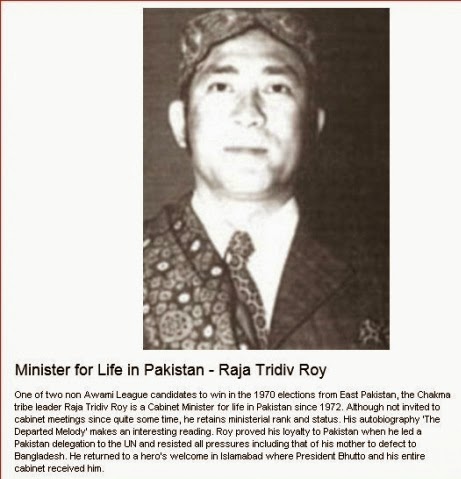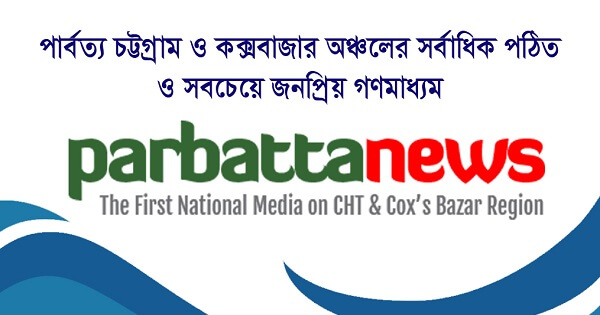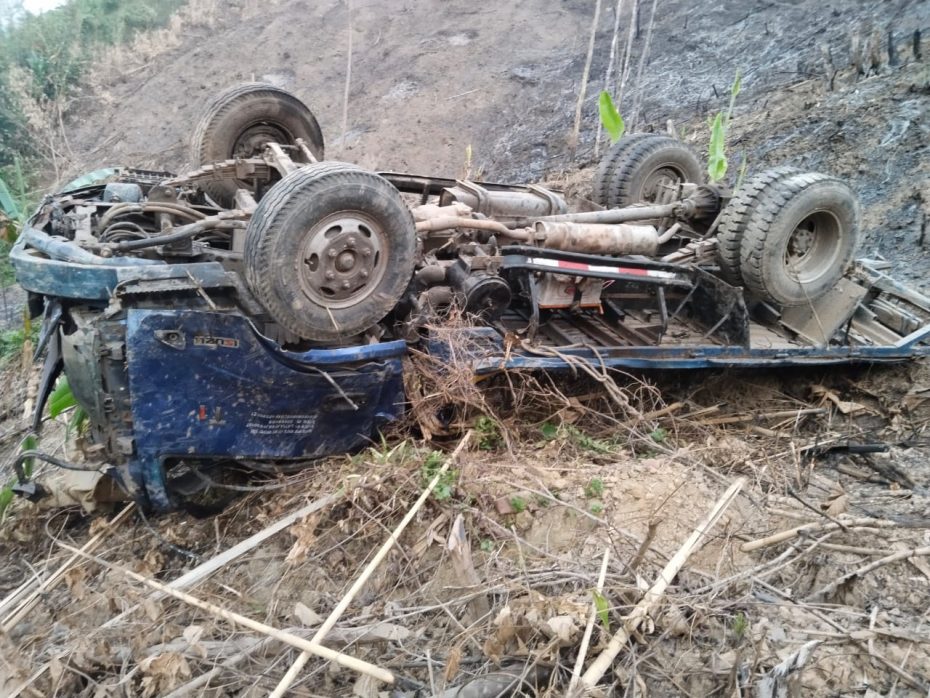Role of tribal leaders of CHT in the Liberation War of Bangladesh
Sayed Ibn Rahmat ::
The Liberation War of Bangladesh is one of the longest liberation wars in the history of the world. On 26 March 1971, the war was started, when Pakistani army launched an operation called ‘Operation Searchlight’. Then Bangladeshi mass people started resisting Pakistani army’s attack by organizing Mukti Bahini (Liberation Force). The 9 months long war ended with the surrendering of almost 93,000 Pakistani soldiers to India-Bangladesh joint forces and liberating Bangladesh (formerly known as East Pakistan) with the separation from (west) Pakistan. Most of the Bangladeshi adult people contributed in the war to liberate their land and earn their rights. Almost 3 million Bangladeshis were killed, 0.2 million women were raped by Pakistani army, almost 10 million people took shelter in neighboring country India as refugee, 30 million people displaced. But very few of the Bangladeshis, betraying with their nation, helped Pakistani army to commit crimes against humanity such as genocide, rapes, firing at people’s residence, etc. Those Bangladeshis were recognized as ‘Rajakar’. Bangladeshi Government has started trial of those Rajakar’s crimes against humanity.To know more about Bangladesh liberation war, please visit the Wikipedia page on the Liberation War of Bangladesh.
Liberation war in Chittagong Hill Tracts
Chittagong Hill Tracts is the southern part and the only very hilly area of Bangladesh. War was extended whole over the country. Chittagong Hill Tracts was never excluded from the war. The then Bangladeshi Government awarded 7 freedom-fighters highest glorious award Bir Shreshtho, who fought for their country with valiant effort and were killed by Pakistani army with the help of Rajakars. Bir Shreshtho Munshi Abdur Rauf was one of those 7 martyrs and killed brutally in Chittagong Hill Tracts while he was fighting against Pakistani army. Bangladesh Government also awarded freedom fighters as Bir Uttam, Bir Pratik, Bir Bikram.
Before the Liberation War of Bangladesh, the general election of Pakistan was held in 1970. In 1970, there were two seats from Chittagong Hill Tracts in the then East-Pakistan parliament, named Rangamati and Bandarban. But the whole Chittagong Hill Tracts was the only constituency of the National Assembly of Pakistan. In 70’s election, Manobendro Narayon Larma was elected from Rangamati seat and A.S Pru Chowdhury was elected from Bandarban. But in National assembly election, the then Chakma Raja (Circle chief- recognized as the chief leader of tribal Chakma community. The post was created in under the Chittagong Hill Tracts Regulation 1900 by the then-British government) Tridib Roy was elected from the Chittagong Hill Tracts constituency. All of those 3 public representatives were from tribal communities and elected as independent candidates.
But the matter of sorrow is any of the above elected persons didn’t stand beside Bangladeshi side in the 71’s liberation war. Rather, they choose Pakistani side, though the-then Pakistani military government was always blamed for removing tribal people from the zones they lived, establishing constructions such as Kaptai Dam and Karnafuli paper Mill. Because millions of tribal people had to leave Kaptai in 1965, as then-Pakistani government was establishing Kaptai Dam to generate electricity. Tribal people lost everything, but the then-government didn’t give them proper compensation. The shocking matter is, the then tribal leaders took the Pakistani military side and betrayed with the Bangladeshi freedom-fighters.
The only then national assembly member from CHT and Chakma circle chief Tridib Roy joined his hand with the Pakistani military. The elected member from Bandarban seat of the then East-Pakistan parliament A S Pru Chowdhury joined the military backed Malik’s cabinet. It is not fully clear about Another East Pakistan parliament member Manobendra Narayan Larma’s role in liberation war. But Bangladeshi prominent writer Humayun Azad wrote that Larma also joined with Pakistanis. But Tridib Roy’s role was much ‘greater’ than A S Pru and Larma’s. Tridib Roy could motivate Chakma young people to go against the Bangladeshis as he was the Raja (‘King’) of Chakma community. Roy influenced Chakmas to join ‘Rajakar’ forces using his ‘headman’ and ‘Karbaris’ who were the influential local leaders of chakma mass people. Pakistani Army could kill many freedom fighters with the help of Tridib’s Rajakar Bahini. As Chittagong Hill Tracts is a very hilly area, it was a difficult task for both freedom-fighters and Pakistani army to direct operations against each-other. But Pakistanis got the much wanted help of local Chakma Rajakars. In November of 1971, Tridib moved to neighboring Myanmar with the help of Pakistanis, after he had understood about the upcoming victory of Bangladeshis. Later, he moved to Pakistan. Though Tridib had led and sponsored Rajakars to kill freedom fighters and commit genocide various times, he never regretted for his crimes against humanity. Rather he wrote a book bantering liberation war and freedom fighters. In his book, he wrote,
Tridib Roy Wrote In His Book About Liberation War of Bangladesh
Increasing lawlessness and violence of the rebel Bengali forces promised no safety to anyone (Page-214) In Rangamati, from 26 March onward, Awami League cadres, in league with the rebel police and the East Pakistan Rifles, began rounding up the Biharis (Page-216). There was a constant supply of food and firearms in commandeered trucks to the Mukti Bahini, comprising rebel EBR (East Pakistan Regiment), EPR (East Pakistan Rifles), and the police. These elements were fighting The Army at Chittagong and elsewhere. People were forced by Awami League cadres to pay money and rice under threat of violence. Many shopkeepers had closed shop and run away. (Page- 217)
In another page of his book, he wrote praising Pakistani military,
On the way back, at Ranirhat, 18 miles from Rangamati, a number of very frightened people asked us when the army was going to take over these areas. They said they were suffering at the hands of the Mukti Bahini. We told them that the army would be coming at any moment. That evening at dusk the army, in launches and speedboats made a sort of miniature Normandy landing (the Allied landing in France of 6 June 1944) at Rangamati and swiftly took command of the situation. (Page-221)
Details of Chakma Raja Tridib’s war crimes against humanity
In a prominent book titled ‘Zuddhaporadhir Talika O Bichar Prosongo (List of War Criminals & Trial Context), written by Dr. M A Hasan and published from Tamrolipi Prokashona in 2009, the list of War Criminals of 1971’s liberation war is provided. The writers listed Tridib Roy as a War Criminal quoting
‘948. Mr. Raja Tridib Roy, Father Late Raja Nalinakhya Roy, Village Rajbari, Rangamati, Thana Kotowaly, Chittagong. (Page – 152)’
In the page no. 93 of 9th chapter of ‘Bangladesher Muktizuddher Dolilpotro (Documents of the liberation war of Bangladesh)’, published by Information Ministry of Bangladesh Government, edited by Hasan Hafizur Rahman, Major General (Bir Uttom) Mir Showkot Ali, fought liberation war directly in CHT area, wrote,
‘Perhaps, we would get help of Chakma tribal community. But because of Raja Tridib Roy’s stance against liberation war, they also went against us.’
The then-district commissioner of Rangamati district H T Imam (Current Advisor of Prime Minister) who also organize liberation war in CHT on behalf of Bangladeshi government, wrote a book titled ‘Bangladesh Sorkar – 1971 (Bangladesh Government-1971)’ in March 2004. In the page no. 260 of above book, H T Imam wrote,
‘Chakma Raja Tridib Roy had been silent and keeping hidden connection with Pakistanis since the very first time.’
In the 63rd page of Lieutenant Colonel (Bir Protik) Kazi Sajjad Ali Jahir’s book ‘Muktizoddha Shahid Captain Aftab Kader Bir Uttam (Freedom-fighter martyr Captain Aftab Kader Bir Uttam)’, published by Bangla Academy in 2008, writer wrote,
‘Raja Tridib Roy & Manobendro Narayon Larma had not been keeping distance from freedom wanted people since first phase of March’.
About Tridib Roy’s war crimes against humanity, researcher Jamal Uddin wrote in his book ‘Parbatya Chattgramer Itihas (History of Chittagong Hill Tracts)’,
‘It is very sad but true that, because of betrayal of a marked tribal leader, (named Raja Tridib Roy) famed ‘Pak-tout’, barbarian Pakistani army could come to Rangamati at that day and started waiting for arriving of freedom-fighters. A team of freedom fighters, regressed from India, was going to the residence of then-district commissioner of Rangamati unknowing Pakistani army’s presence in that area. And they were copped by Pakistani army very easily. Rangamati’s war hero Abdul Shukkur, SM Kamal, Shafiqur Rahman, Iftekhar, Elius, Abdul Bari, Md. Mamun and Abul Kalam Azad were in that team of freedom fighters. Pakistani army killed all of them by torchering brutally, but Abdul Bari and Abul Kalam Azad could flee away.’
Later, Pakistany army could kill many freedom fighters including Bir Shreshtho Munshi Abdur Rab with the help of Tridib Roy led Rajakars.
Shardindu Shekhar Chakma, a chakma writer, included a 71’s conversation with Raja Tridib in his book. He wrote,
‘I said to him (Tridib) that, I guess East Pakistan (present Bangladesh) would be independent and he should have not been up-streant. Tridib Roy took silence for few moments. Then he said, “East Pakistan will never ever be independent unless India can beat Pakistan in the war. And India can never beat Pakistan, because America and China support Pakistan. They will (America & China) never let Pakistan be beaten by India”. I have understood that, he has become much Pakistani than Pakistanis!’
Tridib Roy didn’t stop propaganda against Bangladesh even after war

Analyzing many documents, related with the Liberation War of Bangladesh , it could be known that, Tridib Roy fled away to Myanmar with the help of Pakistani military in November 1971. Later, he moved to Pakistan. After reaching Pakistan (previously west-Pakistan), the then-government sent him to Bangkok as a special consul. Meanwhile in 1972’s UN General Assembly, application on Bangladesh’s membership in the UN was presented. Pakistan government sent a consul team headed by Tridib Roy to UN. Trdib’s assignment was to convince international community not to declare Bangladesh’s membership. Bangladesh Government sent Tridib’s mother Binita Roy to convince him not to go against his motherland Bangladesh and take him back. But Tridib didn’t hearken even his mother and continued lobbying against Bangladeshi membership in UN. Because of lobbying of Buddhist Tridib, China agreed to give veto! That time he could stop Bangladeshi membership in UN.
For his ‘great’ achievement in favor of Pakistan, Julfiqar Ali Bhutto’s government gave him a red-carpet ovary in Airport and awarded him as a ‘national hero’!
In a recent research paper on current Chakma chief Raja Debashish Roy (Son of Tridib) titled ‘Preview: Chittagong Hill Tracts & Chakma Circle Chief Raja Barrister Debashish Roy’, published by Society for National Research and Progress, it is shown that, how Tridib Roy kept connection among anti-Bangladeshi person and his family member, living in different countries till his death. For his ‘great’ contribution in favor of Pakistan, Pakistan’s government awarded him lifetime status of a full cabinet minister. He had been Pakistan’s Federal Minister in 1971, central minister on tourism and minority from 1975-1981, Ambassador of Pakistan in 5 countries of South America in 1981-1995, Ambassador at large with the status of State Minister in 1995, Federal Minister in 2003! He died in Karachi, Pakistan on 17 September 2012.
Shanti Bahini : Heir of Rajakar Bahini
After liberation war, Shanti Bahini was founded by Chakma leader Manobendro Narayon Larma who was keeping distance from freedom-fighters in war days. Shanti Bahini was the real heir of the Rajakar of Liberation War of Bangladesh. They rebelled against the newly born Bangladesh and committed genocide in CHT like Rajakars did. In a book titled ‘Proshonggo : Parbatya Chattgram (Subject: Chittagong Hill Tracts)’ written by Chakma writer Siddharth Chakma, it was written that,
‘…tribal Rajakars went away inside the jungle. Later, they organized themselves and formed a armed organization named Shanti Bahini’.
At first, India didn’t support Shanti Bahini. But after few years, India started sheltering and sponsoring Shanti Bahini to force Bangladesh Government stay under their (India’s) pressure. Though Shanti Bahini also killed thousands of Bangladeshis and committed genocide in CHT, but Bangladesh government signed a ‘peace accord’ with them in 1997. The accord says that, nobody can file a case against shanti bahini ever. Shanti Bahini’s chief Shantu Larma (Manobendra Larma’s brother) was awarded as regional council chairman with the status of State Minister and he has been holding the post since 1997.
Bangladesh Government has started trial of war criminals. But Rajakars (war criminals) of CHT are not being included. Government should steps to start trial of them too. Already ex-opposition party BNP’s leader freedom-fighter Hannan Shah has raised his voice and demanded trial of Shantu Larma for his barbarian activities against Bangladeshi people during rebellion.
Sayed Ibn Rahmat : Journalist; e-mail : [email protected]

















